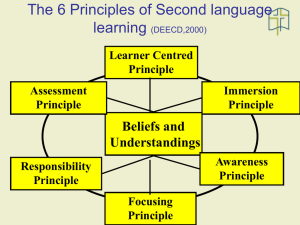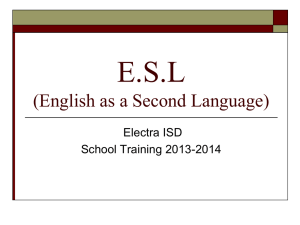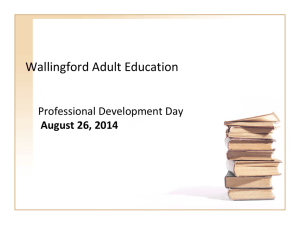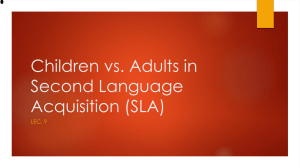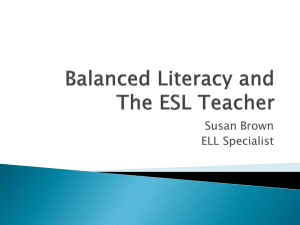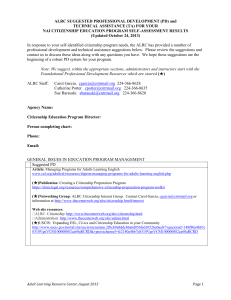many sources for professional development
advertisement
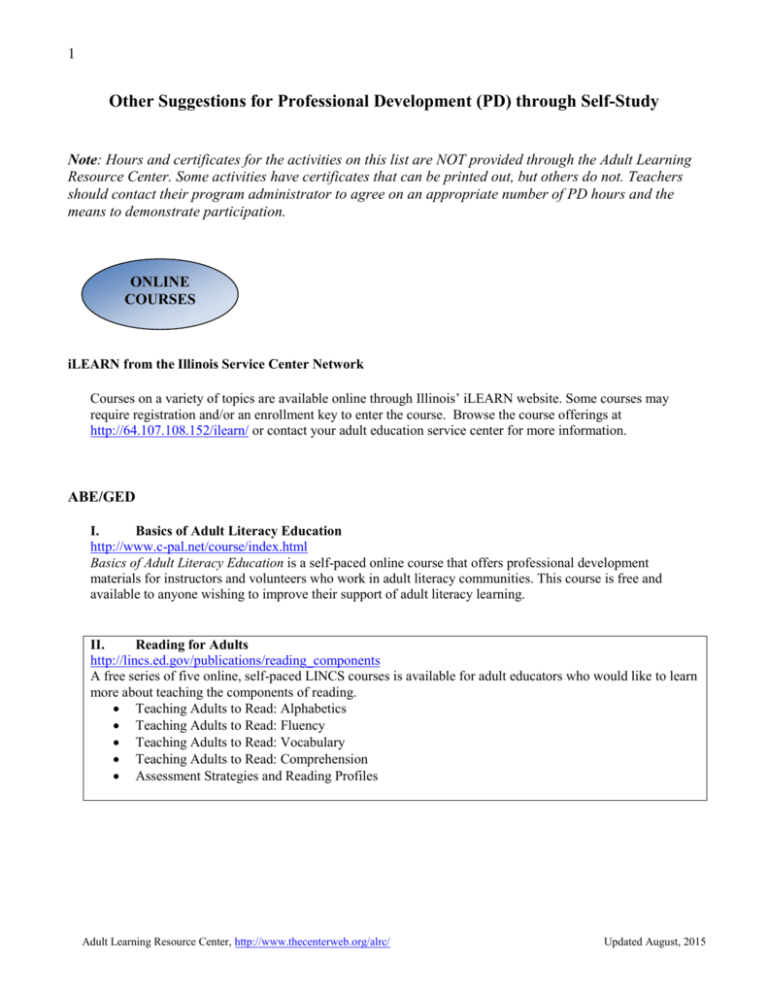
1 Other Suggestions for Professional Development (PD) through Self-Study Note: Hours and certificates for the activities on this list are NOT provided through the Adult Learning Resource Center. Some activities have certificates that can be printed out, but others do not. Teachers should contact their program administrator to agree on an appropriate number of PD hours and the means to demonstrate participation. ONLINE COURSES iLEARN from the Illinois Service Center Network Courses on a variety of topics are available online through Illinois’ iLEARN website. Some courses may require registration and/or an enrollment key to enter the course. Browse the course offerings at http://64.107.108.152/ilearn/ or contact your adult education service center for more information. ABE/GED I. Basics of Adult Literacy Education http://www.c-pal.net/course/index.html Basics of Adult Literacy Education is a self-paced online course that offers professional development materials for instructors and volunteers who work in adult literacy communities. This course is free and available to anyone wishing to improve their support of adult literacy learning. II. Reading for Adults http://lincs.ed.gov/publications/reading_components A free series of five online, self-paced LINCS courses is available for adult educators who would like to learn more about teaching the components of reading. Teaching Adults to Read: Alphabetics Teaching Adults to Read: Fluency Teaching Adults to Read: Vocabulary Teaching Adults to Read: Comprehension Assessment Strategies and Reading Profiles Adult Learning Resource Center, http://www.thecenterweb.org/alrc/ Updated August, 2015 2 III. GED Testing Service A. Professional Development http://www.gedtestingservice.com/educators/professionaldevelopment Several resources for professional development on the GED® Test are offered on this site, including webinars and online courses. B. GED® Test Info: Reasoning Through Language Arts http://www.pbs.org/teacherline/catalog/courses/LEAD1135/ This online professional development course introduces adult education teachers to the 2014 series GED® tests and the Reasoning through Language Arts section. C. GED® Test Info: Mathematics http://www.pbs.org/teacherline/catalog/courses/LEAD1141/ ESL I. ELCivicsonline.org http://www.elcivicsonline.org/ This free, self-paced professional development opportunity assists ESL and EL/Civics teachers help their students learn about the history and government of the United States, become more involved in their communities, and explore the possibility of gaining citizenship while learning English. In addition to the four courses below, there are tutorials on Lesson Planning and Adapting Materials. The four content courses are: U.S. History U.S. Government Civic Engagement The Naturalization Process II. ELL-U (English Language Learner University) http://lincs.ed.gov/programs/ell-u/online-courses Five courses for ESL instructors are available online for independent self-study. Certificates can be printed out, with various numbers of hours for the different courses. Courses include: The Role of Culture in the Education of Adult English Language Learners Teaching ELLs who are Emergent Readers Second Language Acquisition: Myths, Beliefs, and What the Research Shows Formative Assessment to Inform Quality Adult ESL Instruction Principles of Second Language Teaching: Planning, Implementing, and Managing Instruction Adult Learning Resource Center, http://www.thecenterweb.org/alrc/ Updated August, 2015 3 ESL AND ABE/GED COURSES I. Calpro Virtual Workrooms http://www.calpro-online.com/VirtualWorkroom/default.asp The Virtual Workrooms are free courses for independent use, each with multiple modules, videos, podcasts, downloadable resources, and more. Virtual Workroom for Multilevel ESL Instructors Virtual Workroom for Workforce Readiness Virtual Workroom on Best Practices in ABE Reading Instruction II. Proliteracy Education Network http://www.proliteracyednet.org/ These courses are for instructors in the following content areas: Reading, Writing Citizenship ESL Math and Numeracy Getting Started in Instruction SPECIALIZED COURSES TECHNOLOGY Adult Ed Online – Technology Assessment http://www.adultedonline.org/ The two courses on this site evaluate the user’s readiness to use technology in the classroom. Tech Savvy? Is Distance Teaching for You? SPECIAL LEARNING NEEDS Learning to Achieve http://lincs.ed.gov/programs/learningtoachieve/training#online These courses are for teachers who have students with learning disabilities or are interested in learning more about the field. Learning Disabilities and Accommodations Learning Disabilities and English Language Learners Learning Disabilities and Neuroscience Professional's Guide to Educating Adults with Learning Disabilities Adult Learning Resource Center, http://www.thecenterweb.org/alrc/ Updated August, 2015 4 DATA AND RESEARCH NRS Online Courses (National Reporting System) http://www.nrsweb.org/trainings/online.aspx The National Reporting System is the federal agency responsible for overseeing and setting standards for adult education. The courses focus on find, using, and creating data. The 25 minute course, “What is NRS” provides a basic introduction to NRS for teachers. CLASSROOM MANAGEMENT AND RESEARCH I. Understanding and Applying Research in the Classroom http://lincs.ed.gov/professional-development/applyingresearch/player.html These courses are valuable for teachers who wish to carry out action research in their classrooms. Becoming an Informed Consumer of Educational Research Recognizing Credible Education Research Findings Conducting Scientific Investigation Understanding and Applying Education Research II. CAST (Center for Applied Special Technology) UDL (Universal Design) Resources http://castprofessionallearning.org/free-udl-webinars/ CAST Professional Learning offers free webinars to teachers that focus on a variety of topics related to UDL which informs instruction for all the diverse learners in the classroom. In addition, the website has recordings of previous webinars. TEXT RESOURCES ESL AND EL/CIVICS I. Adult Education ESL Teachers’ Guide http://humanities.byu.edu/elc/teacher/teacherguidemain.html This guide is especially useful for the newer adult education teacher. The guide contains a set of lessons for beginning and intermediate level lessons which can be used in a classroom along with instructions that serve as an introduction to the basic techniques and principles for teaching ESL. Also included are a section on teaching non-literate adults and a selected bibliography of ESL materials. II. CAELA Network Briefs http://www.cal.org/caelanetwork/resources/briefs.html “The CAELA Network provides information and resources focusing on high quality professional development for educators working with adult English language learners and makes research findings and evidence-based resources available to practitioners across the nation, who work with this population.” The briefs range from 3 to 8 pages and include research and classroom applications. Adult Learning Resource Center, http://www.thecenterweb.org/alrc/ Updated August, 2015 5 III. Civic Participation and Community Action Sourcebook http://tech.worlded.org/docs/vera/index1.htm ESL teachers who want to give their students opportunities to speak English outside of the four walls of the classroom and ABE/GED teachers looking to apply content to real world situations will appreciate this guide RESEARCH IV. Adult Learner Persistence http://www.nelrc.org/persist/index.html This is a study on reasons adults remain or leave adult education classes with recommendations for teachers. TRANSITIONS V. Promising Practices – National College Transition Network http://www.collegetransition.org/promisingpractices.briefs.html With transition from ESL and ABE/GED to careers and post-secondary, this reading is especially appropriate for both teachers and administrators. ESL Videos I. New American Horizons: The Adult ESL Training Video Project http://www.newamericanhorizons.org/ Examples of the 12 videos (These may be purchased or viewed online for free): Lesson Planning Through Life Skills Building Literacy with Adult Emergent Readers Growing Vocabulary with Beginning Learners II. Understanding, Appreciating, and Respecting Adult ESL Learners http://humanities.byu.edu/elc/teacher/teacher_training/main.html This is a “teacher training video to help new teachers understand adult ESL learners better.” Adult Learning Resource Center, http://www.thecenterweb.org/alrc/ Updated August, 2015

